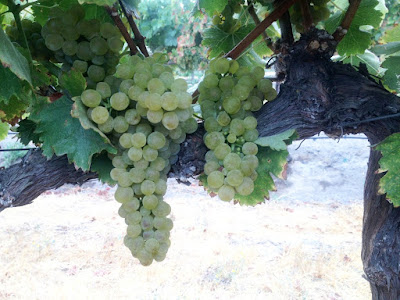The Vine and the Vineyard – 26 April 2021, Anno Domini
N |
OW will I sing to my well-beloved a song of my beloved touching his vineyard. My well-beloved hath a vineyard in a very fruitful hill: 2 And he fenced it, and gathered out the stones thereof, and planted it with the choicest vine, and built a tower in the midst of it, and also made a winepress therein: and he looked that it should bring forth grapes, and it brought forth wild grapes. 3 And now, O inhabitants of Jerusalem, and men of Judah, judge, I pray you, betwixt me and my vineyard. 4 What could have been done more to my vineyard, that I have not done in it? wherefore, when I looked that it should bring forth grapes, brought it forth wild grapes? (Isaiah 5:1-4)
There is a great deal in the Holy Bible concerning Vines and the Vineyard of the Lord. The introductory text above is a simple expression, in human terms, of the Redeemer and the Children of God whether of the Old, or New, Testament Church. The ‘Well- Beloved’ is a figurative term for the Lord Jesus Christ. Observe that He did all the work of redemption necessary for His people, yet, being found in the most suitable of all garden soils and secured by fences; having been provisioned with a watch tower to defend from outside intruder; and having been furnished with the winepress of sacrifice; the grapes that came up were wild – a different nature from the seed planted.
Though this parable of the Old Testament described conditions in Israel and Judah, it also has direct application to the Church today which has fallen into a shambles. Her fruits are not lawful, but licentious. The mainline churches are labeling that which is good, bad; and that which is bad, good.
The Vineyard of the Lord is His Bride, the Church. All that portends judgment of the Church also applies to the institution of Marriage since Marriage is intended by God to be a model and type of the Church.
In the Gospel lectionary text for the 3rd Sunday after Easter, we learn that the nature of our Lord is like unto a Vine which is a conveyance of the lifeblood of the grapevine to the branches resulting in the production of fruit; Christ is the Vine, and we are the branches. We cannot live without the Vine no more than the parts of our body can live without a constant flow of blood. The branches, having been made alive by the nutrients of the vine, will naturally produce fruit. If not, there is something amiss with the branch and it will be cut off.
So, the vineyard is the Lord’s and He is also compared to the Vine itself just as He is referred to as the Good Shepherd of the fold, but also the very Door to the Sheep-fold.
Let’s examine another parable, this time of the Vineyard itself:
H |
EAR another parable: There was a certain householder, which planted a vineyard, and hedged it round about, and digged a winepress in it, and built a tower, and let it out to husbandmen, and went into a far country: 34 And when the time of the fruit drew near, he sent his servants to the husbandmen, that they might receive the fruits of it. 35 And the husbandmen took his servants, and beat one, and killed another, and stoned another. 36 Again, he sent other servants more than the first: and they did unto them likewise. 37 But last of all he sent unto them his son, saying, They will reverence my son. 38 But when the husbandmen saw the son, they said among themselves, This is the heir; come, let us kill him, and let us seize on his inheritance. 39 And they caught him, and cast him out of the vineyard, and slew him. 40 When the lord therefore of the vineyard cometh, what will he do unto those husbandmen? 41 They say unto him, He will miserably destroy those wicked men, and will let out his vineyard unto other husbandmen, which shall render him the fruits in their seasons. (Matthew 21:33-42)
This parable was given before the Jewish rulers and priests in the Temple.
The householder was God the Father, the husbandmen are workers of the Church, the servants who called for the fruit were the prophets of old, and the householder’s son was the Lord Jesus Christ whom, like Jesus, was killed without the gate. Notice how the Lord Jesus allowed the scheming Jewish rulers to pass judgment on themselves in the last sentence above. Many will be condemned by the words of his own mouth.




Comments
Post a Comment